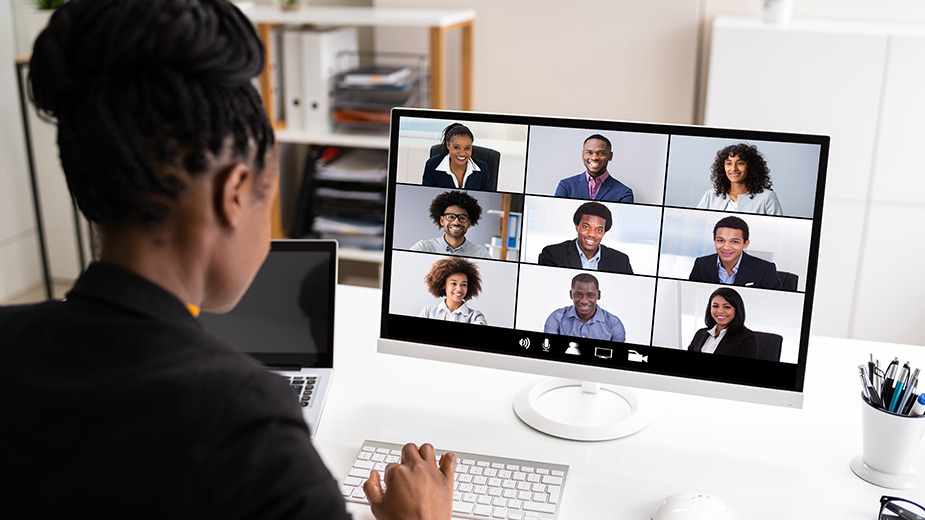YOUNGSTOWN – Last spring, white-collar businesses had to make a hard and fast pivot to remote work. Almost overnight, companies had to adapt to conducting business virtually. By and large, that meant the implementation – or sometimes expansion – of videoconferencing.
It wasn’t always a perfect replacement for the way business was conducted before the pandemic, local professionals say, but it did prove to be a valuable tool that isn’t likely to disappear soon.
“We didn’t do anything in-person for a year. We just started getting back to meeting with some customers in the past month or two. … It has become a big part of our operations,” says Patrick Cioffi, vice president of sales for Neo3. “Moving forward, we’re going to be hybrid. We’ll have some people remote and we’ll have different groups come in. The sales team will meet every couple weeks. Then the projects team will come in.”
Neo3, a provider of enterprise resource planning software, was able to conduct all of its product demonstrations for customers virtually over the course of 2020. Now that vaccines are being distributed, some of the in-person work with clients will resume.
But, Cioffi notes, for those who operate outside the region, videoconferencing remains an option. The company primarily uses the videoconferencing services available through its phone platform, RingCentral.
It’s a similar trend in the legal field, says RothBlair attorney Liz Farbman. Meetings that were once conducted almost exclusively face-to-face have since been changed to virtual meetings, primarily depositions and preliminary hearings.
“Those can be undertaken without requiring people to enter public buildings and sit in a room,” Farbman says. “Depositions can be taken utilizing Zoom or any other software that a court reporter has in his or her repertoire. For the practice, it makes everything much more efficient and decreases costs for clients. … This seems like an innovation and positive technology we’ll see employed for years.”
And for public accounting firm Packer Thomas, the company is likely to stick with remote offerings for established customers, says principal John Cournan. While employees are back in the office, most meetings with customers are still held remotely. After tax season ends – this year in late May – Packer Thomas will begin slowly opening its offices in Canfield and New Castle, Pa.
“We’ve used it for any type of meeting of more than two or three people. We’ve used it for every kind of meeting,” Cournan says. “Quite honestly, I don’t know how we would have gotten through the year if it weren’t for that capability.”
While there were certainly advantages to using videoconferencing, there are also challenges. Cournan says that training newly hired employees – Packer Thomas usually has five to 10 per year – was more difficult remotely, primarily because getting immediate feedback was harder over the internet.
“By being in the office, some of our more senior people are able to connect with newer people to ensure they know how to do their job responsibilities. I think it’s made it easier for the new people to get acclimated,” he says.
But, that hasn’t been the case for everyone. Neo3 hired two new employees last year and thanks to the company’s daily video meetings, they quickly fit into their roles.
“We all got together [virtually] a few Fridays ago and I realized that I hadn’t met them in person. The interview process was done over video and all our meetings are over video,” Cioffi says. “But we still felt like we knew them. It wasn’t weird that we hadn’t met in person because we talked and saw each other every day on video.”
By and large, the three professionals agree that remote work – whether it’s meeting with customers or meeting with co-workers – is here to stay, although the extent varies. Locally, they say, the trend is heading toward a hybrid offering, with some functions done in-person and others virtually, while in the bigger cities, companies are sticking with videoconferencing for the foreseeable future.
“For my colleagues in larger cities … they’ve gone entirely remote and kept things moving,” Cournan says. “In places like Pittsburgh, Cleveland and the D.C. area, they’ve been closed down.”
At Packer Thomas, the hybrid model will most likely include in-person meetings with customers at the start and end of projects, while the updates and work itself is done remotely.
“I could see where you’d have an organization that meets quarterly, having one meeting live and the other two virtually,” he says. “It’s a feature that we think, in some respects, will be maintained forever.”
But even with the hybrid operations model, RothBlair’s Farbman says, companies can still achieve greater efficiency, especially when it comes to meetings.
“I don’t have to drive to Cleveland for a 9 o’clock [scheduling] hearing any more,” she says. “I think it’ll allow people, including lawyers, to be more efficient with their time and work from anywhere. Ultimately, it could give professionals more freedom to use their time more fully, both professionally and personally.”
